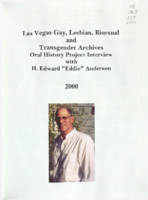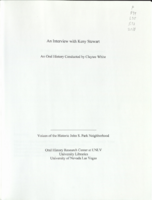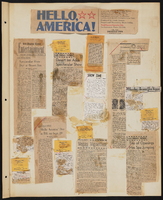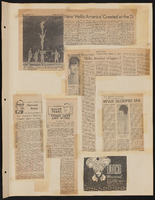Search the Special Collections and Archives Portal
Search Results

Transcript of interview with Edward "Eddie" Anderson by Dennis McBride, October 11-14, 2000
Date
Archival Collection
Description
Dennis McBride interviews Eddie Anderson (born 1946) about his role in advocating for LGBT rights, specifically his participation in the various political and social movements during previous decades. The interview begins with a discussion of Anderson’s background, including his experiences growing up in children’s homes and living with his grandparents. Anderson mentions marching with his grandparents for both workers’ and women’s rights as some of his first political involvements. Anderson also discusses his original aspirations for becoming a priest as well as his memories of meeting President John F. Kennedy during a visit to his high school when Anderson was student body president. Anderson then discusses travelling to the South, specifically in Selma, Alabama, during one summer while in high school in order to help register Black voters. Anderson then discusses his friendship with Nevada Senator Bill Raggio and his wife, and his joining of the U.S. Navy, where he met President Ri
Text

Transcript of interview with Ike Lawrence Epstein by Barbara Tabach, August 24, 2017 and February 2, 2018
Date
Archival Collection
Description
Ike Lawrence Epstein’s office at the recently opened UFC headquarters is sunlit and handsomely decorated. A black and white photo taken by the famous British photographer David Bailey of the Kray brother adorns the wall. Lawrence, as everyone knows him, is the son of Kenny Epstein and Donna Goldstein. He was born, in 1966, and raised in Las Vegas. He attended Vanderbilt University (BA 1989, JD 1992) and then returned to live full time in Las Vegas with his law degree in hand. In addition to being COO of the UFC, he is active in the family business, the El Cortez Hotel and Casino. In this oral history, Lawrence recalls his grandparents, their careers in Las Vegas, and his youthful favorite holidays being Passover and Thanksgiving. He became a bar mitzvah in Israel, a tradition he continues with his own children with Michelle Epstein. Lawrence serves the community as a board member of Meadows School and on the Stadium Board. As an executive with UFC [Ultimate Fighting Championship], Lawrence observes the overall magnitude of sports in Las Vegas in 2017, how it came to this point with professional sports, and what he envisions as the future possibilities of the city as an international sports destination.
Text

Transcript of interview with Keny Stewart by Claytee White, January 16, 2010
Date
Archival Collection
Description
Keny Stewart often sits in his backyard and hears the train whistle. In that moment he thinks about what Las Vegas must have been like in the 1940s—a moment made more meaningful by living in historic John S. Park Neighborhood. He enjoys his place, a place he has called home for 20 years. He was there for the beginning of the neighborhood "renaissance". Keny moved from California to Las Vegas in 1984 to work as an entertainer. One day a few years later he accidentally drove through John S. Park neighborhood, admired the architecture of the homes and the nostalgic feeling. Soon he was a homeowner, restoring his investment, a labor of love. At the time he worked nights on the Strip and restored his house day. Along the way he made a career change to educator/librarian for grade school level. He is a former neighborhood association president. He remembers the neighborhood's battle to maintain its integrity as it went up against local casino developer Bob Stupak's (whose home i
Text

Interview with Louis John Vitale, May 19, 2004
Date
Archival Collection
Description
Text

Interview with Marie Elizabeth (Stever; Daly) McMillan, March 5, 2004
Date
Archival Collection
Description
Text

Interview with Marcell Eugene Bridges, November 19, 2004
Date
Archival Collection
Description
Text

Interview with Zenna Mae (Schmid) Bridges, November 19, 2004
Date
Archival Collection
Description
Text

Interview with Delbert Sylvester Barth, December 3, 2004
Date
Archival Collection
Description
Text


